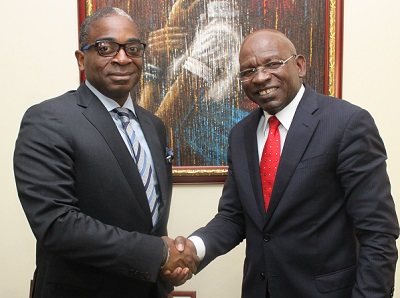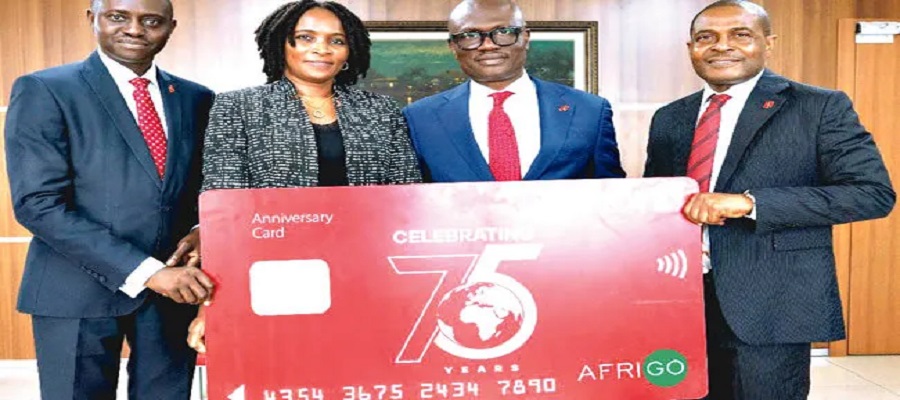E-Financial
NEXIM Creates Synergy with Nigerian Export Promotion Council

Mr. Olusegun Awolowo , newly appointed ED/CE of the Nigerian Export Promotion Council (NEPC), paid a courtesy call to the Managing D/CEO of the Nigerian Export-Import Bank (NEXIM) at the Headquarters of the Bank in Abuja, to discuss areas of possible collaboration and synergy.
The visit would be the first of such courtesy calls by Mr. Awolowo since he was appointed to the position by Mr. President last December.
Welcoming his counterpart to the Government Trace Policy Bank, Mr. Roberts Orya thanked Mr. Awolowo and his team for taking the initial collaborative step, noting that NEPC and NEXIM Bank were the principal agencies of government responsible for the promotion of non-oil exports
The NEXIM MD provided the NEPC team with a snapshot of NEXIM Bank’s mandate, mission and vision stating that the institution was established by Act 38 of 1991 as an Export Credit Agency with the broad mandate to promoting the diversification of the Nigerian economy away from oil and deepening the external sector.
Mr. Orya stated that upon his resumption in August 2009 as the MD/CEO of the Bank, he discovered that the Bank has completely moved away from its core mandate and veered into lending to both oil and gas resulting in a dismal credit performance and loss of both its Shareholders’ and investors’ confidence.
This warranted him to seek the approval of the Bank’s Shareholders to initiate a Corporate Transformation Project (Project Spring) that led to the re-definition of the Bank’s Mission, Vision and Strategic Objectives, with the intention of channelling its resources into the development of four sectors [Manufacturing, Agro – Processing, Solid Minerals & Services].
The MASS sectors were deemed to have high amount of employment and foreign exchange earnings.
An outcome of the Corporate Transformation was crafting of new Strategic Objectives to enable the Bank have a clear market focus and become a major contributor to non-oil exports.
This is in addition to turning it into a world class institution which imbibes best-in-class corporate governance and risk management practices towards becoming a relevant player in the export market with the capacity to significantly influence government trade policies.
Mr. Orya further informed Mr. Awolowo that the Bank is developing the ECOWAS and other Africa regional markets as the traditional market for Nigerian exporters.
The idea is provide a strong platform for our exporters to venture into the more complex markets of Asia and other developed economies in line with the strategy in other jurisdictions where the EXIM Banks first developed their regional market.
Towards developing the ECOWAS market, NEXIM had earlier launched the ECOWAS Trade Support Facility (ETSF) to reduce the level of informal trade and encourage the small scale exporters to use the banking system to leverage their operations.
Mr. Orya informed his counterpart that NEXIM is facilitating the Sealink Project, which will culminate in the establishment of a shipping company to own and operate ocean-going vessels to boost trade within the West and Central Africa.
Accordingly, he invited the NEPC to cooperate with NEXIM in making this project a success hinting that an Investment Memorandum to raise the take-off grant of $60million has been prepared in English and French and the private placement is expected to open before the end of January.
On the outcome of the NEXIM Bank’s transformation initiative, Mr. Orya proudly informed his counterpart, “.we may not have achieved every item of the targets we set in our 5-year strategy plan, but we have completely strengthened our operational processes, instituted the strong pillars of corporate governance, risk management., turned NEXIM Bank from an obscure, loss-making institution to a highly visible and profit-making institution with a robust balance sheet size..We have consistently made and declared profits for three years in a row now, paying dividends to our Shareholders..That has never happened since the Bank was set up in 1991”
In closing, the MD advised NEPC to review the current provisions regarding the Export Expansion Grant to make it more effective, adding that both NEXIM and NEPC needed to work in close collaboration to boost the current level of non-oil exports which had remained below 4% over the past 5 years.
Thanking Mr. Orya for welcoming his team, Mr. Olusegun Awolowo stated that his choice of making NEXIM Bank his first ‘port of call’ upon resumption was based on what he had keenly observed as NEXIM Bank’s innovative disposition to deepening the non-oil sector and committedly contributing to Mr. President’s Transformation Agenda and Vision 20:2020.
The NEPC ED stated that he has great confidence in the country’s ability to meet her development goals and commended the initiatives of NEXIM in enhancing the level of formal trade, noting that the study conducted by NEPC revealed that informal trade annually was about $12bn, far more than the formal trade valued at $3billion.
He promised that NEPC would work closely with NEXIM to improve the level of trade flows and also improve the trade statistics.
Mr. Awolowo assured NEXIM Bank that the NEPC was already working towards reviewing the Export Expansion Grant and that the review will cover the qualification criteria and other aspects.
According to him, “. the new strategic focus will place greater emphasis on market development, with Nigerians in diaspora as major targets..” He noted that that Trade Commissioners have been appointed in major countries including China, Brazil and London to help in developing markets for Nigerian products, especially for the benefit of millions of our Diaspora citizens.
Lauding the phenomenal successes of the NEXIM Bank Corporate Transformation initiative, Mr. Awolowo informed the NEXIM boss that NEPC is also working on human resource realignment to drive export growth, adding that the objective of the new management was to increase the level of non-oil exports by at least 30% in the next 4 years.
In closing, the CEO invited NEXIM Bank to collaborate with NEPC for higher synergies and stressed that both organizations have significant roles to play in developing the Nigerian non-oil exports and that his leadership would encourage and foster even closer collaboration between the two institutions towards supporting Mr. President’s Transformation Agenda and achieving Vision 20:2020 .
E-Financial
UBA Launches Afrigo Card to Revolutionise Domestic Payments

United Bank for Africa (UBA) Plc. Africa’s Global Bank, has launched the Afrigo Card, a revolutionary domestic card scheme aimed at transforming the Nigerian payments landscape.

Officials of UBA at the launch of Afrigo Card
The Afrigo Card, introduced by the Central Bank of Nigeria (CBN) in collaboration with the Nigeria Inter-Bank Settlement System (NIBSS), offers a robust alternative to international card schemes, empowering customers with seamless, naira-denominated transactions tailored to the local market.
A statement by Ramon Nasir, head, Media & External Relations at UBA, said the card has been designed to offer a secure, affordable, and accessible alternative for everyday transactions in line with the apex bank’s ongoing efforts to drive financial inclusion and enhance the digital economy.
The Afrigo Card boasts impressive features, including chip-and-PIN security, seamless payments at ATMs and POS terminals nationwide, 24/7 access to funds, and rewarding benefits for cardholders.
It has been designed to cater to diverse demographics, as it supports low-income earners, artisans, students, and market traders by providing a flexible, affordable, and efficient means of managing finances.
The bank stated that it has been designed to offer a secure, affordable, and accessible alternative for everyday transactions in line with the apex bank’s ongoing efforts to drive financial inclusion and enhance the digital economy.
Shamsideen Fashola, group head of Retail and Digital Banking, UBA, pointed out the card’s versatility and other features of the card and maintained that with the launch of Afrigo, the bank continues to demonstrate its leadership in fostering financial innovation, inclusion, and accessibility for all Nigerians.
“With Afrigo, we are offering a card that speaks directly to the needs of Nigerians – from market women and students to small business owners and low-income earners. The card’s affordability, coupled with its advanced security and potential for biometric authentication and offline transactions, positions it as a vital tool in promoting cashless transactions across Nigeria,” he stated.
Joachim Iloemezue, head of Cards, UBA, emphasised the bank’s commitment to delivering innovative financial products to its customers.
“The Afrigo Card is a game-changer for Nigerians. It not only provides a reliable and affordable alternative for everyday transactions but also ensures our customers enjoy enhanced security, convenience, and nationwide accessibility. UBA remains committed to driving financial inclusion, and Afrigo perfectly aligns with that goal,” Iloemezue said.
Customers can obtain the Afrigo Debit Card for N1,000 plus N75 VAT at any UBA branch.
United Bank for Africa is one of the largest employers in the financial sector on the African continent, with 25,000 employees group wide and serving over 45 million customers globally. Operating in twenty African countries and the United Kingdom, the United States of America, France and the United Arab Emirates, UBA provides retail, commercial and institutional banking services, leading financial inclusion and implementing cutting edge technology.
E-Financial
Court Slams Zenith Bank with N30m Damages over Fraudulent Debits in Customer’s Account

Justice Alexander Owoeye of the Federal High Court in Lagos has ordered Zenith Bank Plc to pay Christomax Concept Limited the sum of N30 million as general and aggravated damages for fraudulently and illegally debiting the firm’s accounts.

The plaintiffs—Christomax Concept Limited, Chris Integrated Company Limited, and Mr. Christopher Adayi—filed suit number FHC/L/CS/2039/2024 through their lawyer, Adetunji Adedoyin-Adeniyi of AAA Chambers, seeking a declaration that the bank’s failure to refund the fraudulently deducted sum constituted a breach of fiduciary duty.
They also requested an order compelling Zenith Bank to immediately refund the N10.6 million.
They further sought:
An order for the bank to write off the balance of a loan granted to the 1st plaintiff on May 27, 2022, since the illegal deductions were not refunded.
An injunction restraining Zenith Bank from taking any action to recover the loan or from harassing or intimidating the plaintiffs.
A directive for the bank to pay N500 million in damages for breach of fiduciary duty.
However, Zenith Bank, in its defense, argued that the suit was wrongly filed as an Originating Summons instead of a Writ of Summons and should be struck out.
The bank contended that the N15 million allegedly deducted was partially recovered, with N5,068,290.00 salvaged from Kuda Microfinance Bank.
The bank further argued that declaratory reliefs could not be granted without solid evidence and urged the court to dismiss the plaintiffs’ claims.
Justice Owoeye, in his judgment, pointed out that Zenith Bank had admitted to issuing a debit card linked to the plaintiffs’ accounts.
He stated that as the card issuer, the bank was responsible for authorizing transactions made with the card, taking action in case of fraud to stop further unauthorized use, and reversing fraudulent transactions when advised or directed.
The judge criticized the bank for failing to act after the fraud was reported on July 13, 2022, describing its conduct as “oppressive and high-handed.”
The court also ruled that the bank’s failure to refund N10,631,710.00, which was fraudulently deducted from the plaintiffs’ accounts, resulted in loss of business and goodwill, amounting to a breach of fiduciary duty owed by the bank.
The court ruled in favor of the plaintiffs and ordered:
An immediate refund of N10,631,710.00 deducted from their accounts.
A payment of N30 million in damages for breach of fiduciary duty, loss of business, goodwill, embarrassment, inconvenience, and hardship caused to the plaintiffs.
This judgment reaffirms banks’ duty to protect customers’ funds and take swift action in fraud cases.
E-Financial
CBN Grants Greenwich Holdings Limited Operational License

Greenwich Merchant Bank Limited has announced that it has received regulatory approval from the Central Bank of Nigeria (CBN) for its financial holding company, Greenwich Holdings Limited.

This milestone, it said in a statement, marks a significant step enabling Greenwich Group to consolidate its existing financial service businesses, expand into new markets, and strengthen its position as a leading player in the financial sector.
Upon the commencement of operations, Greenwich Holdings Limited will oversee Greenwich Merchant Bank Limited, Greenwich Asset Management Limited, and Greenwich Securities Limited, while driving the strategic expansion of the Group.
Ozena Utulu, Head of Corporate Communications, Greenwich Merchant Bank Limited, in the statement said the regulatory approval is an at testament of the dedication, hard work, and commitment to excellence that have defined Greenwich’s legacy as a trusted partner in the financial industry.
“Greenwich Holdings Limited represents a new chapter in the unparalleled growth which began with Greenwich Trust Limited, a foremost provider of financial solutions that commenced operations in June 1994 as a Financial Adviser and Issuing House.
“The SEC-regulated firm later applied to the Central Bank of Nigeria for the conversion of its operations which led to the establishment of Greenwich Merchant Bank Limited in 2020.
“Over the course of 30 years, Greenwich has expanded its footprint across various segments of the financial sector through its subsidiaries and affiliated entities including Greenwich Registrars and Data Solution Limited and Greenwich Trustees Limited.
Greenwich Holdings Limited is committed to delivering innovative financial solutions, fostering growth and creating value for its stakeholders,” the company said.

 Telecom3 days ago
Telecom3 days agoFG to Launch $2Bn Fibre Network Project in Q4 2025

 News3 days ago
News3 days agoCourt Orders Oba Otudeko to Respond to Alleged ₦12.3Bn Loan Fraud Charges

 Telecom3 days ago
Telecom3 days agoMTN’s Earnings Hammered by Free Falling Naira in Nigeria

 E-Financial3 days ago
E-Financial3 days agoCentral Bank Defends Naira with $360m in 5-Day

 E-Business3 days ago
E-Business3 days agoFG Partners Cyberpedia to Fight Misinformation with AI

 News3 days ago
News3 days agoTinubu Congratulates Osakwe, Nigerian on Winning UK Top Cyber Security Award

 Telecom2 days ago
Telecom2 days agoATCON Calls for Telecom Policy Improvements in Nigeria

 E-Business2 days ago
E-Business2 days agoGoogle to Buy Cybersecurity Company Wiz for $32Bn


























